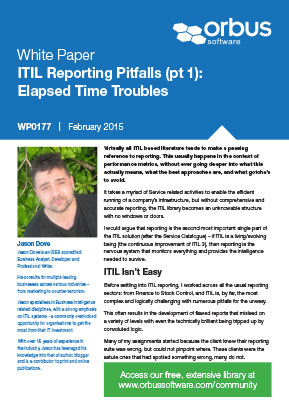In the first of his white paper series on ITIL, Jason Dove looks at the importance of reporting within. If ITIL is a living/evolving being then reporting is the nervous system, monitoring everything and providing the intelligence needed to survive.
Virtually all ITIL based literature tends to make a passing reference to reporting. This usually happens in the context of performance metrics, without ever going deeper into what this actually means, what the best approaches are, and what gotcha’s to avoid.
It takes a myriad of Service related activities to enable the efficient running of a company’s infrastructure, but without comprehensive and accurate reporting, the ITIL library becomes an unknowable structure with no windows or doors.
I would argue that reporting is the second most important single part of the ITIL solution (after the Service Catalogue) – if ITIL is a living/evolving being (the continuous improvement of ITIL 3), then reporting is the nervous system that monitors everything and provides the intelligence needed to survive.
Before settling into ITIL reporting, I worked across all the usual reporting sectors: from Finance to Stock Control, and ITIL is, by far, the most complex and logically challenging with numerous pitfalls for the unwary.
This often results in the development of flawed reports that mislead on a variety of levels with even the technically brilliant being tripped up by convoluted logic.
Many of my assignments started because the client knew their reporting suite was wrong, but could not pinpoint where. These clients were the astute ones that had spotted something wrong, many do not.
This is the reason for this series of white papers: to highlight the three most common and disruptive ITIL Reporting mistakes. There are many (MANY) more, but these are the big three.
Sign in to continue reading the ebook from Jason Dove, or check out the related resources below.
